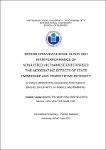| dc.description.abstract | Ownership structure has long been an intriguing topic on which many
scientific papers have been investigated. The aim of this study is to examine the impact
of institutional investors’ ownership on earnings management. Using 1,981
observations from 2010 to 2020, this study examined whether the ownership of
institutional investors in the United States affects firms’ real earnings management. In
terms of earnings management, I focused on REM and found that institutional
investors’ ownership and the sorts of proxies used to measure real earnings
management had a negative correlation, with CEO duality selection as a moderator
variable. Since corporate governance mechanism in the United States is welldeveloped, it can have a considerable affect on the practices of earnings management.
A corporation's board of directors, management, shareholders, and other stakeholders
all play a role in determining how the firm is run through its corporate governance
structure. Other fraud and smoothing of earnings problems can be reduced if it is
properly used and regulated. | en_US |


